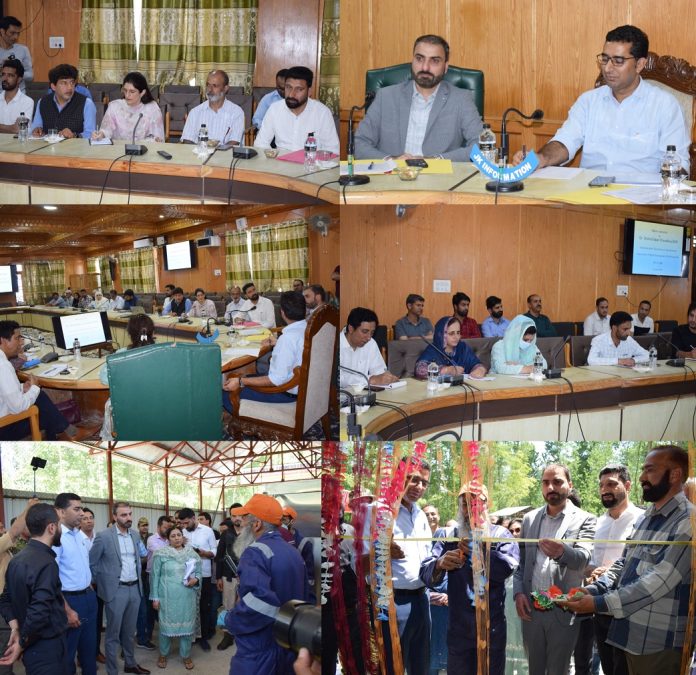Visits Plastic Waste Management Unit at Kakapora
SRINAGAR: Secretary, Rural Development Department (RDD) and Panchayati Raj, Dr Shahid Iqbal Choudhary on Tuesday visited Pulwama to assess the progress of door-to-door waste collection, Plastic Waste Management Units (PWMUs), and other assets established under the Swachh Bharat Mission-Gramin (SBM-G) in the district.
He was accompanied by Deputy Commissioner, Pulwama, Dr. Basharat Qayoom, Director General, Rural Sanitation, J&K, Anoo Malhotra and other field officers of the district.
Dr Shahid emphasized the importance of efficient waste management systems in rural areas and underscored the significance of proper waste disposal mechanisms in preserving environmental health and hygiene.
Secretary RDD interacted with local officials and stakeholders to gauge the challenges and requirements in sustaining the ongoing waste management initiatives.
Dr Shahid emphasized the importance of investing in the capacity building and training of field functionaries involved in sanitation efforts.
Secretary RDD stressed the need to provide exposure and ownership to these functionaries, underscoring their pivotal role in the success of sanitation initiatives.
He discussed the status and challenges of plastic waste management in the region, mentioning that around 116 PWMUs are physically complete and 23 are under construction in J&K.
Dr Shahid asked officials not to start new units until the current ones are fully operational, emphasizing quality over quantity.
He pointed out the gaps in functionality and the need for proper planning and machinery to ensure the units serve their purpose effectively.
Secretary RDD underscored the significance of community involvement in sanitation initiatives, particularly through the establishment of village level sanitation committees. He encouraged officials to focus on capacity building at the grassroots level, empowering communities to take ownership of sanitation efforts.
Dr Shahid stressed the importance of a structured approach, urging officers to develop a comprehensive plan from start to finish.
Secretary RDD also discussed the need for coordination between urban and rural agencies in waste management efforts.
He emphasized the importance of a systematic approach, stressing the need for institution-specific plans that transcend individual roles.
Dr. Shahid urged officials to set measurable targets and develop comprehensive plans to achieve them, emphasizing the importance of accountability and tangible outcomes.
In addition to discussing plastic waste management, Dr Shahid addressed the need for innovative solutions in sanitation infrastructure, particularly community sanitary complexes.
Dr Shahid unveiled plans to construct a network of community sanitary complexes (CSCs) along major highways and public places in the union territory.
He said we can set up 100-200 CSCs along highways in J&K along main roads and tourist routes to serve the public efficiently.
DG, Rural Sanitation, J&K, Anoo Malhotra underscored the necessity for effective implementation of sanitation and waste management programs across district.
She stressed the importance of completing the verification process within the specified timeframe and urged officials to ensure accurate documentation before submission.
DG Rural Sanitation called for meticulous planning and preparation for upcoming projects, including the completion of Detailed Project Reports (DPRs) and Request for Proposals (RFPs) for construction assets.
Addressing concerns about infrastructure and resource availability, she emphasized the importance of identifying suitable land parcels for Faecal Sludge Treatment Plants (FSTPs) and ensuring adequate electricity and road connectivity for project sites.
Furthermore, Malhotra discussed the expansion of waste management initiatives to include construction and demolition waste, e-waste, and sanitary waste.
Officials were urged to collaborate with engineers to develop effective waste disposal strategies and explore opportunities for increasing the capacity of existing facilities.
She also underscored the importance of institutionalizing feedback mechanisms and grievance redressal systems at the district level to ensure effective communication and transparency.
DG Sanitation also addressed the Open Defecation Free (ODF) Plus model, calling for verification through self-help groups to ensure accurate ground reports.
Earlier, Secretary, Rural Development and Panchayati Raj, Dr Shahid Iqbal Choudhary inspected the Plastic Waste Management Unit at Kakapora Pulwama to assess the functionality of assets created under SBM-G.
He also interacted with the Sanitation Committee of Kakapora. The discussion encompassed various aspects of sanitation management, including current challenges, successes, and future plans.
Dr. Shahid sought insights from the committee members regarding the effectiveness of existing sanitation initiatives, community involvement, and any specific needs or concerns they might have.


